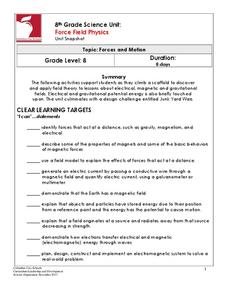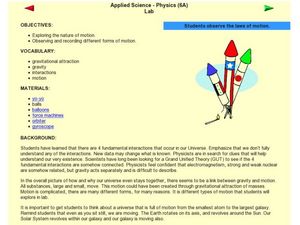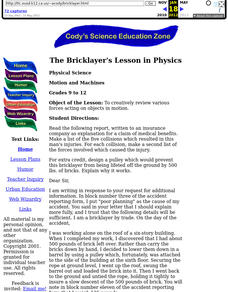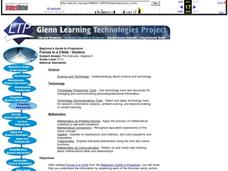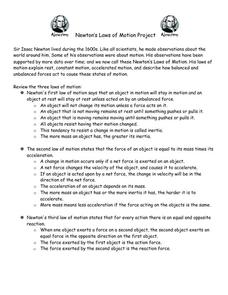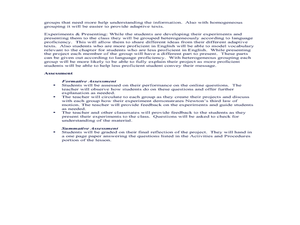Curated OER
Forces and Motion
Fifth graders participate in a series of hands-on, Web-based activities and video-based activities to extend their learning of Forces and Motion.
Columbus City Schools
Force Field Physics
Attracted class members to an activity-packed journey through the science behind the invisible forces at work all around us. From jump rope generators to junkyard wars, there's never a dull moment when eighth grade physics scholars...
Curated OER
Motion, Force, and Gravity
Students write a research paper about human space travel. In this space travel instructional activity, students watch a video and research issues related to space travel. They use their research to write a paper about whether human space...
Curated OER
A Multimedia Presentation to Describe Newton's Laws of Motion
Eighth graders use various sources to find pictorial evidence of Newton's laws of motion in everyday life. They use various sources of technology to import those pictures into a multimedia presentations.
Curated OER
Newton in Motion Project
Students investigate Newton's Third Law of Motion as it exits in real world applications. They watch as the teacher makes a simple balloon powered car before explaining how the motion of the car demonstrates Newton's Third Law of Motion....
Curated OER
Playing With Science
Young scientists investigate the scientific concepts and principles that help make common toys such as hula hoops, yo-yos, slinkies, and silly putty work. As a class, they read "Backyard Rocket Science, Served Wet" to get a look behind...
Curated OER
Motion Experiment
Learners experiment with the laws of motion. In this motion instructional activity, students explore Newton's Laws of Motion. Learners work in groups experimenting with different objects and observing different types of motion.
Curated OER
Keep In Touch: Communications and Satellites
Fourth graders explore communications by reading assigned space science text. In this satellite lesson, 4th graders identify the concept of orbiting and examine gravitational pull by viewing diagrams. Students are assessed based on...
Curated OER
Motion in the Ocean
How does the formation of currents and waves in the ocean happen? High schoolers will learn about the primary causes for ocean currents and waves by calculating a wave's amplitude and nautical mile speed. Then they will complete a...
Curated OER
The Bricklayer's Lesson in Physics
Students read a simulated report, written to an insurance company as explanation for a claim of medical benefits. They list the collisions that resulted in the injuries, and identify the forces involved which caused the injury.
Curated OER
Forces in a Climb - Vectors
Students read Forces in a Climb from the Beginner's Guide to Propulsion, and explain each of the formulas using vectors.
Curated OER
Circular Motion
Students research physical science by completing worksheets. In this gravity lesson, students read assigned text regarding the rotation of Earth and the gravitational force caused by the speed of which it rotates. Students complete a...
Sharp School
Newton’s Laws of Motion Project
After a review of all three of Newton's laws, physical scientists complete a choice project. They can create a book in which they collect pictures where the laws of motion are depicted, produce a PowerPoint presentation, or produce a...
Curated OER
Raptor Force
Students observe a video about pilots, their desired traits, and explore the similarities between a bird and an airplane. Using paper, wood or foam, they design create an aircraft to be flown in a competition to see which plane will fly...
Curated OER
Isaac Newton's Third Law of Motion
Ninth graders experiment with Isaac Newton's Third Law of Motion. In this Third Law of Motion lesson, 9th graders develop an experiment that shows their understanding of this theorem. They work in small groups to read an article at a...
Curated OER
Gravity, Forces, and Inertia
Young scholars participate in assessments involving gravity, forces, and inertia. They select from a menu of options assessments they would like to complete including worksheets, drawing posters, watching videos, creating crossword...
Curated OER
How Wind Works
Second graders investigate the process that creates wind. In this wind lesson, 2nd graders create a wind diagram. Students write an essay to accompany their diagram.
Columbus City Schools
Totally Tides
Surf's up, big kahunas! How do surfers know when the big waves will appear? They use science! Over the course of five days, dive in to the inner workings of tidal waves and learn to predict sea levels with the moon as your guide.
Curated OER
Angular Momentum (Automaticity)
Second graders experience practicing with a wide variety of vocabulary terms that relate to the Vista/Module "Angular Momentum:" momentum, inertia, force; motion, direction, centripetal force; angular momentum, gyroscope, resist. They...
Curated OER
The Legendary Raptors
How are raptors and airplanes alike? Combine science and language arts in this fun and interactive project. Young scientists research the animal in order to design their own aircraft, and compete in a contest for farthest, fastest, and...
Curated OER
Leonardo Lives
Learners investigate the concepts of force and motion. They describe how motion is created by force. Also students define a simple machine and the factors of application to creating force or motion. They analyze the plans of Leonardo De...
Curated OER
Friction In Our Lives
Fourth graders explore friction. They examine the effects of friction in the movement of objects. Students discover how friction helps and hinders us in our daily lives. They answer questions and participate in activities to demonstrate...
Curated OER
Aeronautics: Bernoulli's Principle
Students explore physics by participating in a science activity in class. In this flight properties instructional activity, students identify Bernoulli's principle of flight and his theory of statics and motion. Students conduct a...
Curated OER
Elements of Physics: Motion, Force and Gravity
Young scholars research about different human space explorations conducted by NASA. In this physical science instructional activity, students discuss why space exploration is important. They write a paper about their thoughts on...

